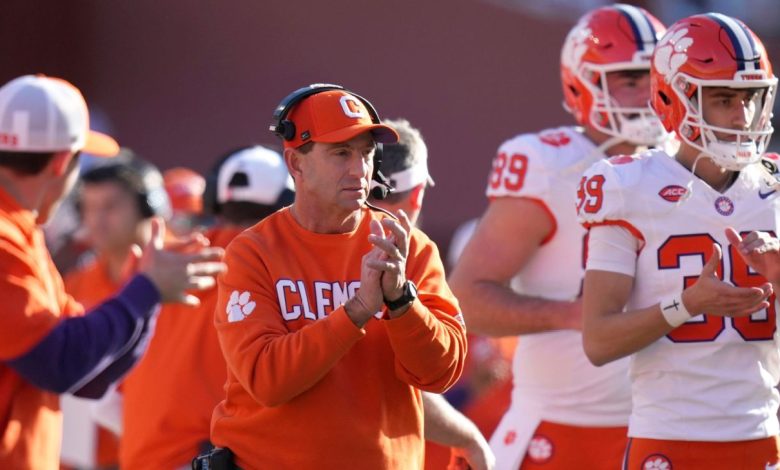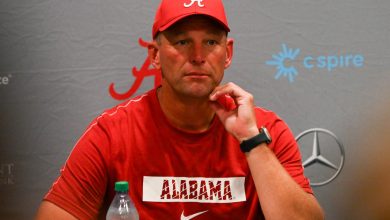Georgia football ranks low in returning production for the upcoming season, facing challenges in maintaining dominance with roster turnover.

The Georgia Bulldogs have been a dominant force in college football over the past few seasons. Under head coach Kirby Smart, the team has built a reputation for its dominant defense, powerful running game, and overall depth of talent. With back-to-back National Championships in 2021 and 2022, Georgia has solidified itself as one of the premier programs in college football. However, as the 2025 season approaches, there is a looming challenge that could affect the Bulldogs’ quest for another championship: a significant drop in returning production.
In the world of college football, returning production is a key indicator of a team’s potential for success in the upcoming season. The more experience and talent a team brings back from the previous year, the more likely they are to maintain or even improve upon their performance. Unfortunately for Georgia, the team ranks low in returning production entering the 2025 season, a stark contrast to the loaded rosters they’ve had in the past. With so many key players from last season’s championship squads leaving for the NFL and graduation, the Bulldogs will face challenges in maintaining their dominance.
What is Returning Production, and Why Does it Matter?
Returning production refers to the number of players a team brings back from the previous season, especially those who contributed significantly in various roles. In a sport like college football, where rosters turn over frequently due to player eligibility and the NFL Draft, the ability to retain experienced players is vital. Teams that have high levels of returning production often have a more seamless transition from one season to the next because they have established players who know the system, have developed chemistry, and can help guide the younger, less experienced players.
For Georgia, the returning production metric is particularly important because of the program’s success in recent years. Their ability to reload with top-tier recruits each year has allowed them to stay near the top of the rankings. But, with several key departures in both the offensive and defensive units, Georgia will need to rely on young, unproven talent to step up in 2025.
Key Departures and What They Mean for Georgia’s 2025 Outlook
One of the most significant reasons for Georgia’s low ranking in returning production is the number of key players who have left the program. The Bulldogs saw a slew of elite players enter the 2024 NFL Draft, many of whom were vital to Georgia’s success during their championship runs.
- Stetson Bennett (Quarterback) – Stetson Bennett, the Bulldogs’ quarterback for the past few seasons, was one of the most important players in the program’s history. As a dual-threat signal-caller, Bennett led Georgia to back-to-back national titles and was instrumental in guiding the offense with poise and maturity. With Bennett gone, Georgia will have to find a new quarterback to take the reins. This is one of the most pressing concerns for the Bulldogs as they enter 2025, as they don’t have a proven quarterback with the same leadership qualities or experience that Bennett provided.
- Jalen Carter (Defensive Tackle) – Another critical loss for Georgia is Jalen Carter, who was one of the most dominant defensive players in college football. As a key figure in the Bulldogs’ stellar defensive line, Carter’s ability to disrupt the opposition’s offense and pressure the quarterback will be sorely missed. Replacing a player like Carter is no small task, and Georgia will need to develop new defensive linemen to fill the void left by his departure.
- Kenny McIntosh (Running Back) – The loss of McIntosh in the backfield is another major hit for Georgia. McIntosh was a dynamic and versatile back who contributed both as a runner and as a pass-catcher out of the backfield. His departure leaves Georgia with a less experienced group of running backs, which could affect their ability to control the game and maintain offensive balance.
- Broderick Jones (Offensive Tackle) – Jones was a cornerstone of Georgia’s offensive line, providing solid protection for Bennett and creating space for the running game. With Jones off to the NFL, Georgia will need to replace him with younger, less experienced players who must quickly gel to maintain the offensive line’s dominance.
- Ladd McConkey (Wide Receiver) – McConkey was a reliable target in Georgia’s passing game, and his absence will leave a noticeable gap in the Bulldogs’ receiving corps. While Georgia still has a talented group of wide receivers, McConkey’s ability to make big plays in key moments will be difficult to replace.
In addition to these high-profile departures, Georgia also lost several key defensive players and experienced depth across multiple positions. This turnover presents a significant challenge for Smart and his coaching staff, as they will need to reload the roster with a mix of experienced veterans and incoming recruits. The lack of returning production from these key contributors will undoubtedly make it more difficult for the Bulldogs to continue their dominant play at the same level as in years past.
The Challenges Ahead: Replacing Experience with Youth
While Georgia’s recruiting classes have been elite in recent years, there is a significant difference between a highly-rated freshman and an experienced upperclassman who has seen significant playing time. Georgia’s low returning production means that much of the roster will be comprised of untested players, and it will be up to Smart and his coaching staff to develop these players into capable starters.
At the quarterback position, Georgia’s main challenge is finding someone who can manage the game while also making plays when necessary. The competition for the starting job will likely be intense, with several young quarterbacks vying for the role. While there is talent in the quarterback room, none of the candidates have the same level of experience or leadership that Bennett provided.
On the defensive side of the ball, Georgia will need to replace some key players in the front seven, including Carter. This will be especially difficult because the Bulldogs have relied on a dominant defensive line to control games in recent years. Without Carter’s presence, Georgia will need to rely on younger players to step up and take on larger roles. While the Bulldogs still have a strong defense overall, replacing a player like Carter will be one of the toughest challenges Smart faces heading into 2025.
In the backfield, Georgia will also need to develop a new running back who can fill the shoes of McIntosh. While the Bulldogs have some promising young players, McIntosh’s versatility will be difficult to replace. The team will need to rely on a committee of backs to carry the load, but this lack of experience could be a concern early in the season.
How Georgia Can Overcome Its Low Returning Production
Despite the challenges that come with low returning production, Georgia still has several advantages that should help them remain competitive in 2025.
- Elite Recruiting – One of the reasons Georgia has remained so successful is its ability to recruit top-tier talent. While the team may have lost several key players, the incoming recruiting class is loaded with blue-chip talent that will have the opportunity to step in and make an immediate impact. The Bulldogs will rely on their elite recruiting efforts to fill gaps left by departing players.
- Depth and Development – Under Smart’s leadership, Georgia has built one of the deepest rosters in college football. The team has been able to develop talent and create competition at nearly every position, ensuring that even with turnover, the Bulldogs will have capable players ready to contribute. The program’s focus on player development will be critical in 2025 as Georgia looks to replace its lost production.
- Coaching Stability – One of the main reasons Georgia has been so successful in recent years is the stability within the coaching staff. Smart has built a system that works, and while there will be some growing pains in 2025, the coaching staff is capable of adapting and finding ways to put their players in the best position to succeed.
- Strong Defense – Although Georgia has lost some key defensive players, the Bulldogs’ defensive culture remains strong. Smart is a defensive-minded coach, and Georgia’s defense has been one of the best in the country for several years. With returning playmakers and the influx of new talent, Georgia’s defense should continue to be a force, even without the same level of star power as in previous years.









